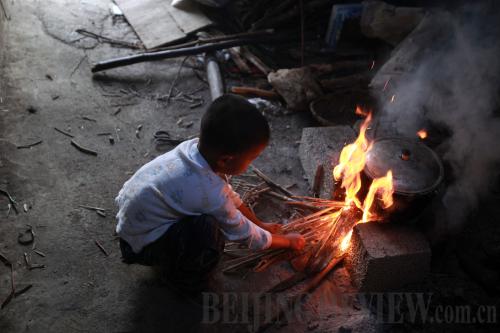|
 |
|
LIFE IN SOLITUDE: A-Long, a 6-year-old orphan from Guangxi Zhuang Autonomous Region, lights up a fire to cook meal at home (CFP) |
An HIV-positive mother can infect her child during pregnancy, delivery and breastfeeding. Clinical studies show about 81 percent of infections occurred during pregnancy and delivery, whereas 9 percent happened during breastfeeding, said Wang.
Anti-retroviral therapy, caesarean delivery and feeding infants with formula milk can reduce the likelihood of transmission. Expectant mothers can also opt to terminate the pregnancy.
Transmission prevention
China piloted the prevention of mother-to-child transmission in 2002. In 2003, the Ministry of Health officially launched the prevention program in eight counties or cities in the most seriously affected places.
The prevention program has been scaled up over the years. Now free mother-to-child transmission prevention services are available in 1,156 counties, or about 40 percent of all counties in China, Wang said. Almost all counties in seriously affected provinces and autonomous regions have been covered.
Currently, national surveillance of pregnant women shows 0.05 percent of them are infected with HIV, Wang said. To her knowledge about 20 percent of the infected choose abortion.
Without intervention, the probability of mother-to-child transmission in China is about one third; now doctors are able to bring the average chance of transmission down to 5 percent, Wang said.
More pregnant HIV-positive mothers would like to give birth as medical technology and practices have reduced the chance of infection, Wang said.
Under the government's "Four Frees and One Care" policy, HIV positive pregnant women can get free drugs to prevent mother-to-child transmission and newborn babies can get free HIV testing.
The "Four Frees and One Care" policy also offers free AIDS drugs to rural residents or city-dwellers without insurance, as well as free voluntary counseling and testing in seriously affected regions, free schooling for AIDS orphans and care and economic assistance to needy households of those living with HIV/AIDS.
AIDS program in Beijing
Treating HIV/AIDS sufferers is a specialization of Beijing Ditan Hospital. The hospital treated its first AIDS case in 1987. Since then, it has had a total of 1,064 AIDS out-patients and 545 in-patients. It has a dedicated AIDS ward, which can accommodate 41 in-patients at any given time, according to the hospital.
A number of doctors and nurses in the hospital have received training on treating AIDS patients in such countries as the United States, the UK, Japan and Thailand. The AIDS program is at an advanced level in China, and has reached international standards.
The hospital started its program to prevent mother-to-child HIV transmission in 2003. Currently, 20 to 30 HIV positive mothers deliver babies in the hospital each year, said Pang Lin, director of the hospital's pediatrics department.
The newborns are tested 42 days, six months and 18 months after birth. Tests show so far, all these newborns are HIV free, Pang said.
Sometimes, it is difficult to follow up with the newborns, Pang said. After leaving the hospital, the newborn's family might change telephone numbers or addresses, intentionally for anonymity or unintentionally after moving.
Pang has engaged in the prevention and treatment of AIDS among children since 2004, after conducting a year of research on infection and immunity at Vanderbilt University in the United States.
When asked whether her family members and friends worry that she could get the virus and transmit it to them, Pang said that some of the people she knew were concerned, but as her parents and husband are all doctors, they understand her choice.
"AIDS is just another infectious disease, just like hepatitis B and many other contagious diseases," Pang said, adding that, as long as proper medical procedures are followed, it should be fine.
The number of HIV infected mothers that have given birth in the hospital has increased over the years, due to wider coverage of HIV surveillance and knowledge about preventive measures, Pang said.
Prevalence of HIV/AIDS in Beijing is low, except for particular high-risk groups, said Zhao Chunhui, the deputy head of Beijing Municipal Health Bureau.
Zhao said on November 30 that, a total of 8,395 cases had been documented since the first case was reported in the city in 1985. About 48.1 percent of total cases were sexually transmitted, reported Xinhua News Agency.
In Beijing Ditan Hospital, there is also a Home of the Red Ribbon, which was originally founded in 1999 as an office to serve HIV/AIDS sufferers.
The red ribbon is an international symbol of HIV/AIDS awareness. It is worn by people to show care and concern.
Over the years, the Home of the Red Ribbon has grown into an independent non-profit organization that offers medical and psychological consultation plus legal assistance to people living with HIV/AIDS. It also organizes advocacy activities, with help from numerous volunteers.
When talking about what her organization can do for AIDS orphans like A-Long, Wang Kerong, director of the organization's office, said they help them to get free AIDS treatment and medicine, and apply for assistance from local civil affairs departments.
"We have helped a total of more than 10 children to get medical treatment for AIDS in Beijing Ditan Hospital," Wang said. | 